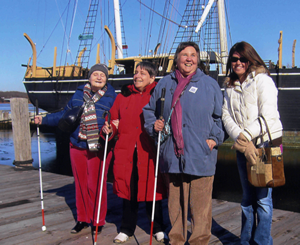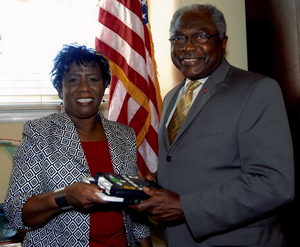National conference to be held in San Antonio
Our Digital World highlights the implementation of the digital talking book
The 2008 National Conference of Librarians Serving Blind and Physically Handicapped Individuals will convene May 4–8 at the St. Anthony, a Wyndham Historic Hotel in San Antonio, Texas. A preconference workshop on local digital recording will be held on Saturday, May 3, from 9 a.m. to 4 p.m.
The conference, titled Our Digital World, will focus on the NLS implementation plan for the forthcoming launch of the digital talking-book (DTB) system. NLS section heads will present program overviews to the attending network librarians, and provide training on the new digital players and downloading procedures and updates on the digital talking book production schedule.
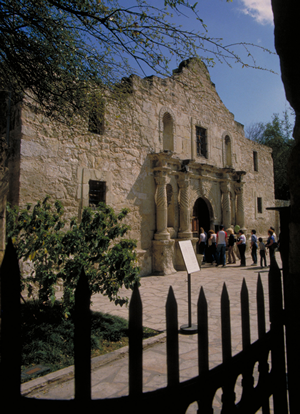
Monday’s keynote address will be given by Larry P. Johnson, author of Mexico by Touch, a memoir of his solo journey to Mexico City, taken at age eighteen, and the following twenty years there, during which he became Mexico City’s top deejay, competed against Stevie Wonder in a foot race, broadcast the 1969 Apollo 11 lunar landing, and became the first blind newscaster on Mexican television.
Other speakers include Marc Maurer, president of the National Federation of the Blind, who will present Reflections of a Lifetime Reader and Library Maven, and Julie Todaro, president of the Association of College and Research Libraries, a division of the American Library Association.
The national conference will open on Sunday at 1 p.m. with a welcome address by NLS director Kurt Cylke and division director of the Texas State Library and Archives Ava Smith. Conferees will receive updates on the transition to digital talking books from NLS managers. Staff of the NLS Materials Development Division, led by Michael Katzmann, will discuss DTB system implementation, and Network Division chief Carolyn Sung will discuss communications and training plans. Regional conference meetings will follow.
User group meetings of the Consortium of User Group Libraries (CUL), with Karen Keninger of the Iowa Regional Library; Keystone Library Automation Services (KLAS), with Catherine Durivage of the Minnesota Regional Library; and the Readers Enrollment and Delivery System (READS), with Keri Putnam of the Nevada Regional Library, are also on the agenda.
The Herman H.B. Meyer Memorial Literary Club and Declamatory Society will host a reception on the hotel’s Starlight Terrace on Sunday evening. Participants will be given a tour of Texas Regional Library offices and circulation facilities on Tuesday afternoon, followed by a reception at the Lyndon Baines Johnson Library and Museum. The conference will wrap up with a barbeque dinner at the Enchanted Springs Ranch, in Boerne, an eighty-six-acre working ranch with Texas Longhorn cattle, horses, and buffalo.
San Antonio: Where friends meet
Donde los amigos se encuentran
Steeped in history and tradition, yet modern and spirited, San Antonio is a cultural crossroads and a meeting place—and it is the site of this year’s National Convention.
The sounds and flavors of many cultures—African American, German, and Native American and the Deep South, Old Mexico, and the Wild West—mingle and merge in San Antonio, giving visitors who are drawn to history much to explore.
Before European exploration, Native Americans settled along the San Antonio River, calling it "Yanaguana," meaning "refreshing waters." When Spaniards and missionaries arrived on the banks of the river during a 1691 expedition, the party stopped to celebrate the feast day of Saint Anthony of Padua. They named the area and the river "San Antonio."
A fort was built in the early eighteenth century, and later a mission that would become the famous Alamo. "Remember the Alamo" became the words that rallied Texas settlers against the Mexican army led by Santa Ana in 1836. For thirteen days 189 defenders, including Davy Crockett, fought off 4,000 Mexican troops before being defeated. The vibrant and modern city of San Antonio sprouted up around the old mission, which is now preserved as a shrine and a museum.
San Antonio is also home to Fort Sam Houston, where over a century ago African American cavalry fighters, known as the Buffalo Soldiers, trained as lawmen to secure the western frontier. In 1886 the fort temporarily housed Apache chief Geronimo as a prisoner of war. Military leaders such as World War I general John "Black Jack" Pershing, World War II brigadier generals Joseph W. "Vinegar Joe" Stilwell and President Dwight D. Eisenhower also served at Fort Sam.
Twenty feet below street level the San Antonio River winds through the downtown business district. Bordered by cobblestone paths it forms the city’s famous River Walk, a two-and-a-half mile stretch of lush greenery, flowers, sidewalk cafes, and shops. Tourists take in the sights as open-air boats cruise along.
This year’s national convention will be at the St. Anthony, a historic hotel in the middle of downtown San Antonio, just three blocks north of the River Walk and three blocks northwest of the Alamo.
For a map of San Antonio’s River Walk, go to www.visitsanantonio.com, select "Plan" and then "Maps and Neighborhoods."
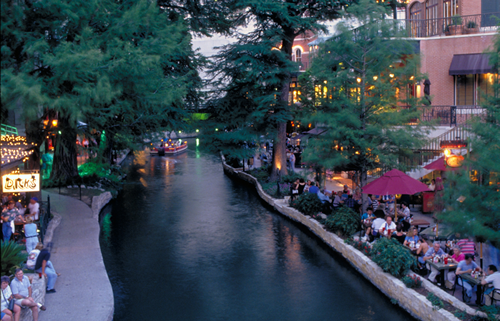
Final test on NLS digital talking-books completed
On December 21, 2007, one hundred patrons finished a comprehensive series of tests of the digital talking-book player and cartridge before prelaunch production. This field test was designed to examine every aspect of the digital talking-book flash-memory cartridge and its container, the player and its mailing carton, as well as the delivery integrity of the products, both downloaded from the Internet and shipped through the U.S. Postal Service. The tests also verified the accuracy and usefulness of the large-print and braille instructions and the audio player guide, and provided insight on the level of support that will be required by the network during the transition.
"NLS will now analyze the results of the last usability test on the digital talking-book machine before manufacturing. The player has come a long way from conception, and we are looking forward to the outcome of this test," said Michael Katzmann, NLS chief of Material Development Division.
The one hundred field test participants included fifty participants from the download pilot who were selected nationwide from the group of patrons involved in the download pilot and fifty patrons of the regional library in Rocky Hill, Connecticut. All test participants received a package containing either an advanced or basic digital talking-book player, large-print and braille user guides and safety instructions, and cartridges. The fifty Connecticut patrons initially received four books each from a preselected total of twenty titles for each participant. Additional titles were downloaded from the NLS site and duplicated on demand at the Connecticut library, labeled, and hand delivered. The download patrons received one blank cartridge and a USB connecting cable so that they could select, download, transfer, and read as many available books as they wanted.
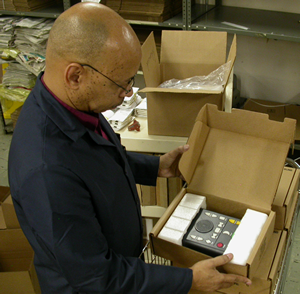
This field test on the digital talking-book machines was different from other usability tests conducted in libraries because it required participants to use the digital players and books in their own homes. Also fewer participants used the players over a period of days with facilitators and observers present. Participants used the players for three weeks and were encouraged to read books as they normally would, as if distribution of digital books and players had already begun. They were also instructed to read at least one book a week and to use the player in a variety of situations, including on battery power.
"The goal of the field test was to put the digital system through heavy use in a typical environment to check whether any fine-tuning is necessary prior to manufacturing," said Katzmann.
The players, book cartridges, and cartridge containers were evaluated in terms of reliability and usability. The test was facilitated by a contractor familiar with the project. He collected and summarized data then evaluated the results. During the test, the contractor interacted with the Connecticut participants, delivering books, probing for problems, and encouraging more reading and more mobile use of the player battery. They also received technical support through an 800 number. Downloaders submitted comments and feedback using a web form or e-mail. Findings will be examined by NLS and necessary modifications will be relayed to the manufacturers of the player, cartridge, and container once contracts are in place.
Digital download pilot begins transition to NLS BARD
As NLS continues to expand its digital download program, it is poised to launch an official site—NLS BARD—where all eligible patrons who have an Internet connection will be able to download books and magazines. The NLS download pilot was launched in October 2006.
The name BARD—Braille and Audio Reading Download—was inspired by the work of scholars and musicians, called bards, who were renowned for composing and reciting works of wisdom and cultural knowledge that were orally passed through the generations.
"More than nine thousand digital titles are currently available for download and we are adding new titles to the web site every day," said NLS automation officer Michael Martys. The downloadable materials include children’s titles, Spanish-language books, and thirteen magazines.
"I feel as though I am in a library for the first time in my life."
NLS digital download pilot participant
The site, which will continue to use the NLS Talking Books heading until the name NLS BARD becomes standard, is a work in progress. Neil Bernstein, NLS research and development officer, said that Martys "built the web site and tools for the project." In August 2007, upgrades to the site offered patrons technical support and the option to set personal preferences. The site automatically updates newly posted materials for patron use and performs administrative functions that allow NLS staff to determine the types of materials that most interest patrons.
"The web site is very basic and is designed to meet the comfort level of average users," said Martys. Any eligible patron who owns a commercial player can fill out an application at www.nlstalkingbooks.org/dtb. Once registered, patrons may log on and download books.
In the future, NLS BARD will support duplication-on-demand. Once this feature is in place, NLS patrons will be able to access digital talking books in two ways: by requesting a title from regional librarians who will download the books onto a player cartridge for use in NLS digital players, or by downloading a title directly from NLS BARD onto a player cartridge or a commercial flash drive using home computers and then transferring the cartridges into the NLS player or a commercially available player. (Commercial flash drives will require an additional component for use in NLS players.)
As of December 2007, one thousand patrons were enrolled in the download program. Comments from these users have prompted the Automation Office to improve download speed and add functions while continuing to build the site. Other plans include expanding the site to accommodate more users and to provide troubleshooting tools for NLS staff.
Martys and his staff will continually add and adjust patron features after NLS BARD is officially launched. Patrons will then have the option of receiving automatic daily or weekly notifications when new titles are added and will have access to all NLS digital resources, such as Web-Braille.
The digital download service is ancillary to the digital talking-book program but Martys predicts it will grow as computer-savvy users seek access to talking books. He expects heavy use by librarians, followed by moderate use by blind and physically handicapped patrons. He also projects that as librarians determine which portions of the digital talking-book catalog receive the most requests, they will download whole portions onto their library’s system to save time filling requests from patrons.
Who is eligible for the expanded pilot?
At this stage of the digital download pilot, patrons interested in enrolling in the program must meet several criteria. First, patrons must have subscribed or borrowed NLS titles in the past twelve months. Until production of the new digital players is complete, patrons must also have access to a commercially available digital player that is compatible with NLS materials, have an e-mail address, and have access to high-speed Internet.
To date, the commercial player available for use with BARD is Victor Reader Stream from HumanWare; Icon from Levelstar and the Braille+ from American Printing House will soon be available.
Network Exchange
Albany librarian receives ACB’s Senator Flynn Award
Somers honored at retirement celebration
At her retirement party in April 2007, Jane Somers, director of the New York State Talking Book and Braille Library (TBBL), Albany, New York, for twenty-two years, was presented the Senator Flynn Award by the American Council of the Blind of New York. The award is given to an individual who has made a strong impact on the lives of blind and visually impaired persons in the areas of access, legislation, new product design, systemic goals affecting blind and visually impaired individuals, or significant support to ACB.
Somers, who began as director in 1985, worked with many community groups across the state during her tenure to promote and improve the service. She attended many state conventions and legislative seminars, often acting as a guide on tours, and kept library patrons and ACB members informed of TBBL and NLS issues. Somers was a member of the NLS Audio and Braille Magazine Study Advisory Committee, created in 1995 to study patron satisfaction with the NLS selection of magazine titles and identify potential areas for change. The findings of the study led NLS to produce all audio magazines exclusively in cassette format, beginning in 2000.
Schroth named Educator of the Year
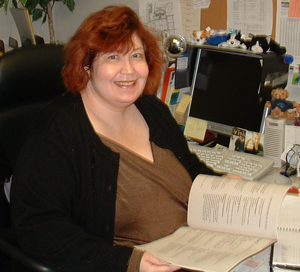
The National Federation of the Blind of Louisiana presented the 2007 Educator of the Year award to State Library of Louisiana children and teen services librarian Emma K. Schroth, Baton Rouge, on March 31, 2007.
Schroth was recognized for her ten years of service at the State Library of Louisiana’s Services for the Blind and Physically Handicapped, during which she has provided service to local schools and coordinated an annual summer reading program.
"I am proud of Emma; she typifies the care and compassion demonstrated by the entire library staff," said Rebecca Hamilton, state librarian.
Angèle Davis, secretary of the Office of the Department of Culture, Recreation, and Tourism, which oversees the state library, said, "Emma is devoted to her work in serving the needs of visually impaired and physically handicapped readers. She is an exceptional example of the work that the State Library of Louisiana does."
The National Federation of the Blind of Louisiana (NFBL), an organization of hundreds of blind and visually impaired Louisianans, works closely with the State Library of Louisiana and refers its members to the Services for the Blind and Physically Handicapped for free library service.
Wolfner’s Summer Sleuths
From Seventy-seven young readers from ten schools participated in the summer reading programs Get a Clue @ Your Library and YNK at Wolfner Library for the Blind and Physically Handicapped in Jefferson City, Missouri.
Wolfner had fifty-three super sleuths and daring detectives take part in its Get a Clue @ Your Library program, as part of a collaborative effort with more than forty other states to raise awareness about the importance of literature in the lives of young readers. The theme was selected to encourage patrons from preschool through middle school to become summer sleuths and investigate what their local libraries have to offer.
Participants were divided into three groups—read-to-me, beginning readers, and independent readers—and earned a book in audio or braille format, along with other prizes, for achieving their personal reading goals. Each child set his or her own reading goal and counted the amount of time spent reading, not the number of books read.
The library’s program YNK attracted twenty-four teens. YNK is popular shorthand for 'you never know,'" explained Nancy Doering, youth services librarian. As with Get a Clue, each YNK participant received a packet with suggested reading materials and activities and earned books and prizes for reaching their personal reading goals.
In both programs, fifty-three of the seventy- seven readers reached their goals.
2008 Exhibit Schedule
NLS will exhibit at eleven conferences during the remainder of fiscal year 2008 as part of its public outreach effort. Audiences are selected to maximize contact with potential patrons and groups that work with eligible individuals. Exhibits are staffed by personnel from NLS and local network affiliates.
April 9–12
National Association for Music Education
Milwaukee, Wisconsin
April 17–19
National Braille Association
Dallas, Texas
May 4–8
National Conference of Librarians Serving Blind and Physically Handicapped
Individuals
San Antonio, Texas
June 6–10
American Diabetes Association
San Francisco, California
June 26–July 2
American Library Association National Conference
Anaheim, California
June 29–July 5
National Federation of the Blind
Dallas, Texas
July 1–6
National Education Association
Washington, D.C.
July 5–12
American Council of the Blind
Louisville, Kentucky
July 22–28
Association for Education and Rehabilitation of the Blind and Visually
Impaired
Chicago, Illinois
August 11–13
Blinded Veterans Association
Phoenix, Arizona
September 4–6
American Association of Retired Persons
Washington, D.C.
Collection Development Advisory Group recommendations
The annual meeting of NLS Collection Development Advisory Group will be held in Washington, May 21–23, 2008. This year, the twelve members representing consumers and librarians will discuss recommendations for NLS magazine and book selections.
2007 recommendations
At its 2007 meeting, the advisory group presented eight recommendations. Members
advised that NLS restore the Collection Development Section (CDS) to its
full staff levels, including a foreign language librarian and a senior selection
librarian. They suggested that NLS survey readers’ preferences to verify
that patron needs are being met and that NLS share this data with CDS staff.
The group also urged NLS to increase the use of tactile graphics in press
braille books, especially in those for children.
Members also proposed that NLS continue to produce Spanish-language books, especially nonfiction, including books on self-help, personal investment, citizenship, and family activities. The advisory group encouraged NLS to expand the use of bestseller lists representative of minority populations in its selection process. Additionally the committee reaffirmed their 2006 recommendation advising that the NLS Magazine Committee convene within the year to evaluate titles for currency and relevance, to possibly add pertinent titles such as the New Yorker and Audiofile, and to consider these two titles for inclusion in the Magazine of the Month program.
The group recommended that the NLS Kids Zone web page include information alerting users that children’s bibliographies are available from other cooperating libraries and suggested that the CDS children’s librarian produce additional bibliographies for the Kids Zone.
The Program
The National Library Service for the Blind and Physically Handicapped of the Library of Congress publishes books and magazines in braille and in recorded form on discs and cassettes for readers who cannot hold, handle, or see well enough to read conventional print because of a temporary or permanent visual or physical handicap.
Through a national network of state and local libraries, the materials are loaned free to eligible readers in the United States and to U.S. citizens living abroad. Materials are sent to readers and returned by postage-free mail.
Books and Magazines
Readers may borrow all types of popular-interest books including bestsellers, classics, mysteries, westerns, poetry, history, biographies, religious literature, children's books, and foreign-language materials. Readers may also subscribe to more than seventy popular magazines in braille and recorded formats.
Special Equipment
Special equipment needed to play the discs and cassettes, which are recorded at slower than conventional speeds, is loaned indefinitely to readers. An amplifier with headphone is available for blind and physically handicapped readers who are also certified as hearing impaired. Other devices are provided to aid readers with mobility impairments in using playback machines.
Eligibility
You are eligible for the Library of Congress program if:
- You are legally blind--your vision in the better eye is 20/200 or less with correcting glasses, or your widest diameter of visual field is no greater than 20 degrees;
- You cannot see well enough or focus long enough to read standard print, although you wear glasses to correct your vision;
- You are unable to handle print books or turn pages because of a physical handicap; or
- You are certified by a medical doctor as having a reading disability, due to an organic dysfunction, which is of sufficient severity to prevent reading in a normal manner.
How to Apply
You may request an application by writing NLS or calling toll-free 1-800-424-9100, and your name will be referred to your cooperating library.
News is published quarterly by:
National Library Service for the Blind and Physically HandicappedLibrary of Congress
Washington, DC 20542
All correspondence should be addressed to the attention of Publications and Media Section.
Editor: Ingrid Davitt
Writers: Lina Dutky, Paula Higgins, Dorothy Hill, Sabreen Madyun, and Casandra Middleton.
